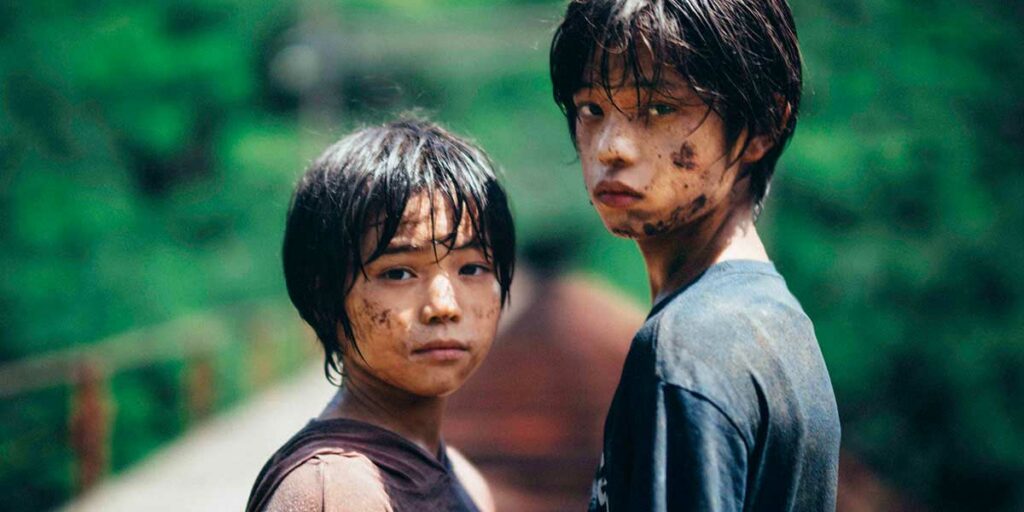Monster uses its multiple perspectives to paint a masterfully subdued picture of childhood, acceptance, and the longing for freedom.
Because of how my schedule and slated films for TIFF have worked out, I write most of my reviews roughly a day after actually seeing the respective movie. This sometimes requires me putting myself back into a certain headspace to recall my thoughts, memories, and the overall feeling of watching each film. I tell you this because as I sit down to do that for Monster, I’m suddenly feeling a heavy weight slowly coming back down, almost making me need to take a breath to focus in on the task at hand. Just thinking back to Monster is enough to do that. I know that sounds obnoxiously corny, and I rarely ever say it even about some of the best movies I’ve ever seen, but … wow, this film just gets under your skin. And it does so in such a quiet, sneaky, chillingly patient way.
In Japan, Saori Mugino is a single mother to her young son Minato (Sōya Kurokawa), who’s starting to behave strangely, ask unsettling questions, develop injuries, and chant about some sort of unknown monster. When he tells her his teacher Mr. Hori (Eita Nagayama) has been abusing him, she demands answers from what turns out to be a disturbingly indifferent school. As the film continues, we find out the situation is far different from what she thinks, and as we see the perspectives of her, Mr. Hori, and Minato, the truth is gradually revealed.
Going into Monster, you can obviously make any number of speculations or guesses as to what exactly is going on and even what type of film this is going to end up being. But no matter what your expectations are, Monster is a film that takes them and slowly, meticulously peels them away, like an onion that transforms before your very eyes with each layer that’s shed. And like with real onions, those eyes may water in the process. Every new perspective changes the way you look at every single character, or at least your predictions of what everyone is really going through, serving one of the film’s themes of determining who or what the real “monster” is in this mysterious situation.
I became familiar with director/editor Hirokazu Kore-eda’s style when I watched Shoplifters to prepare for TIFF. To call his touch behind the camera delicate would be like calling David Lynch’s touch a little odd. The purposeful precision of every single shot of his is only matched by the raw tenderness of each soft yet painful moment. Every sound, from calming nature to cries of anger, rings loudly despite its subdued volume, a beautifully uncomfortable paradox. The pacing is glacial yet still feels like it’s propelling you quickly. The emotions are in plain sight but not always up close, letting them either sting or warm your heart that much more when they’re put just within arm’s length.

Monster is as far from being in your face as a film can probably get, which is something that can very easily backfire. I’ve stated in the past that I think it is possible for a film to be too subtle, to be so indirect in its themes and motifs that it results in an emotional disconnect. Monster is a film that almost crosses that line, to a point where even when it lays all its cards on the table regarding what it’s actually about, I still wasn’t 100% sure I was interpreting it as intended. But the hyper-subdued, underplayed subtext is balanced perfectly with the more upfront emotions and blunt dialogue that get you to feel exactly what the film wants you to feel and, even more than that, when it wants you to feel it.
Very few characters’ intentions are ever clear at first, and you’re usually thrown off your guard if you think they are. The indirect storytelling of Monster supports that entirely, as you learn a little bit more about Minato in particular by going through the perspectives of his mother and teacher … or you think you’re learning a bit more. Monster is about what children hide when they believe they have to, and how that translates to the older and more experienced adults believing they have a grasp on the struggles of the youth. The hostile culture and toxicity that often festers among children and the environment they’re growing in also plays a role, tainting the picture even further. By the time you reach the end, you realize that the uncertainty of what’s been motivating everyone was always the point.
The answers of Monster are not the sensational, shocking twists you may think they are in a film with this premise, which threw me for a major loop but again fits the gentle approach so perfectly. Even in the third act when it looks like we’re finally getting the true answers, the film bides its time so liberally that it’s only in the last ten minutes where you really grasp the heavy burden of Minato’s experiences. Once that happens, everything clicks into place, and you’re left with so many lingering thoughts about childhood, acceptance, and the longing for freedom.
If it sounds like I’m being pretentiously overwrought or excessively vague here, that’s because there’s really no way for me to talk about Monster in a more concrete or down-to-earth sense. Like I’ve been saying, this is a film that’s begging to slowly surprise you at every turn. I feel like if I got into any specifics, I’d be denying you part of the journey. That’s not to say the film itself would be lesser if viewed any other way, but your first-time experience would be. I really have to just discuss how I felt while watching it without giving specific examples to explain why.
Which is to say, this is all how I personally felt watching the film. I can’t sit here and promise that you’re going to feel the exact same way or even be moved by Monster at all, largely because of how subtle so much of the storytelling is. The devil is in the details with this film more than almost any that I can think of in recent memory, and it very intentionally tests how long you can go without shouting, “What’s the point of all this?” I think the third act in particular is where many viewers are going to have this sentiment, because that’s when I was starting to itch for some sort of greater purpose. If that’s you, then my advice would be to just bear with it, and it should all make sense by the very end.
Because Monster spells so little out, it opens itself up to be dismissed as either confusing, aimless, or meaningless. And I really would understand if anyone reacts to the film in that way. I’ve had that response to certain films of this nature, believing them to be so downplayed that they wind up being too cold. But if you’re as patient as the film itself is and just let each compelling moment play out, you’re at least far more likely to see what I see here.
As of right now, it’s hard for me to say whether Monster is my personal favorite film of TIFF so far. I just need more time to sit on it and let everything settle, as it’s just as slow to sink in as the pacing of the film proper. But I can confidently say that this is the best film I’ve reviewed during the festival, and the film that amazed me the most with its storytelling. I’m not saying this is the only film to ever use different perspectives to depict the same events. That goes all the way back to, at the very earliest, 1950’s Rashomon. I’ve just never seen it done quite this way. And it’s very, very rare that a film hits me in the particular way Monster hit me. It seems like I’m far from the only one with this reaction, and I have a strong sense that I’ll be far from the last.
Monster premiered at TIFF and was released in NYC on November 22, in LA on December 1, and nationwide in December 2023. The film will be out on Digital in the US on March 12, 2024 and will open in cinemas in the UK & Ireland on March 15.

